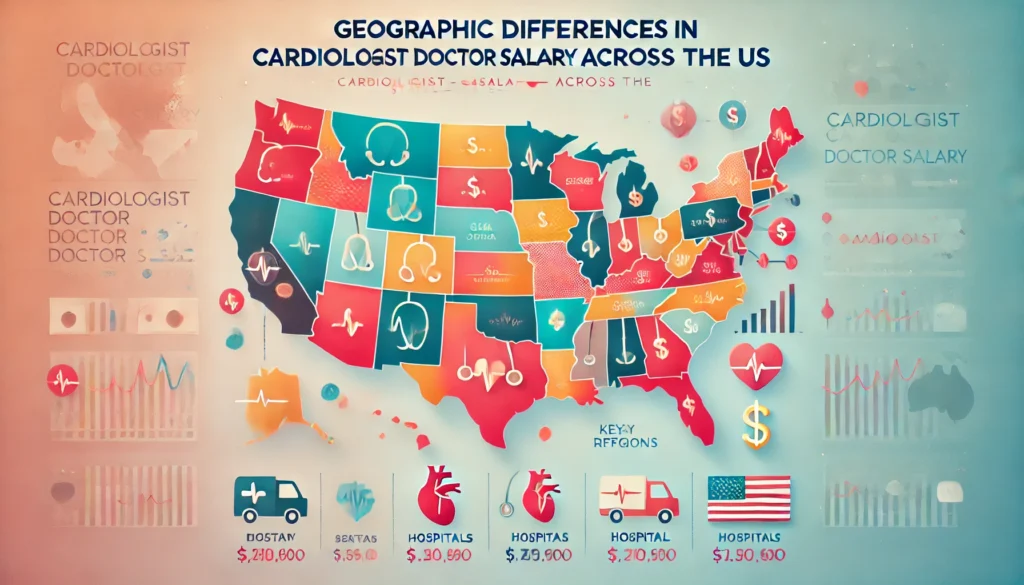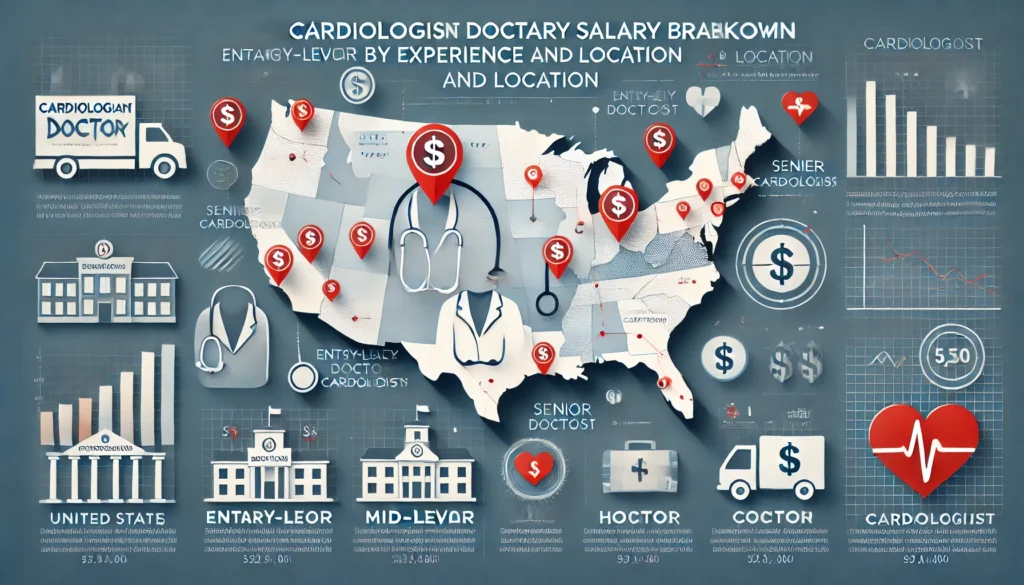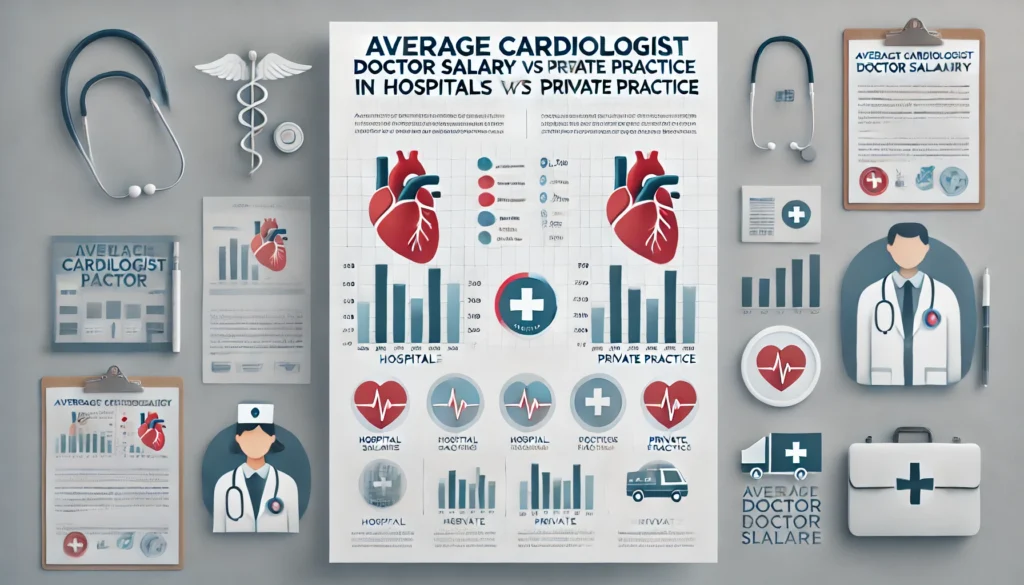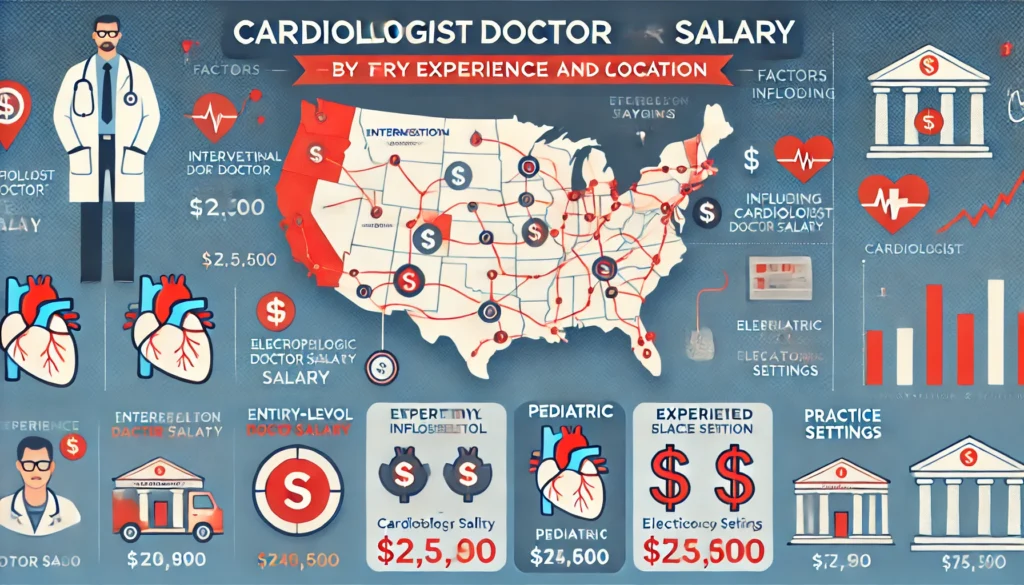How much does a cardiologist doctor make, and what factors influence their salary? When understanding a cardiologist’s salary, many factors influence their earning potential. Cardiologists, highly specialized medical professionals, can command impressive salaries, but their amount varies significantly depending on their experience, geographic location, and work setting.
In this post, we’ll dive into the various factors that contribute to cardiologist compensation. From the influence of years in practice to the impact of region and work environment, we’ll discuss how cardiologists are paid, offering insights from industry surveys and studies. Whether you’re a current cardiologist or an aspiring one, understanding these factors can help you navigate your career path and optimize your earning potential.

Factors That Influence Cardiologist Doctor Salary
The cardiologist doctor salary is not a one-size-fits-all figure. Various elements, such as experience, education, Qualifications, and specialized training, all significantly determine how much a cardiologist makes. Let’s explore these critical components in detail.
Experience and Years in Practice
Experience is one of the most significant determinants of a cardiologist’s salary. As with many professions, years of practice often correlate with higher earnings. Cardiologists typically start their careers at a lower salary and can see substantial increases over time as they gain more experience and build their reputations.
- Early Career (0-5 years): Entry-level cardiologists with less than five years of experience typically earn between $200,000 and $350,000 annually. These figures can vary based on location, with urban centers offering higher compensation due to the higher cost of living and demand for specialists.
- Mid-Career (5-15 years): Cardiologists who have been in practice for 5 to 15 years can expect a salary increase, often between $350,000 and $500,000. They may also take on leadership roles as they gain more expertise, which can further increase their income.
- Experienced Cardiologists (15+ years): Cardiologists with over 15 years of experience are often the highest earners in the field, with salaries ranging from $500,000 to $700,000 or more. These professionals often work in prestigious hospitals or private practices, and their experience in complex cases makes them highly sought after.
Education and Specialized Training
The educational path to becoming a cardiologist is long and rigorous, reflected in the potential salary. After completing medical school, aspiring cardiologists must undergo a residency program, followed by a fellowship in cardiology. This process can take over a decade, but the financial rewards can be significant.
Cardiologists specializing in specific areas such as interventional cardiology, electrophysiology, or heart failure often command higher salaries than their generalist counterparts. For example:
- General Cardiologists: General cardiologists who treat a broad range of cardiovascular conditions typically earn $300,000 to $500,000 annually, depending on experience and location.
- Interventional Cardiologists: Specializing in procedures like angioplasties and stent placements, interventional cardiologists tend to earn more, often surpassing $500,000 annually due to the highly specialized nature of their work.
- Electrophysiologists: Cardiologists who focus on the heart’s electrical systems also earn higher salaries, often in the range of $400,000 to $600,000. Their expertise in treating arrhythmias and conducting procedures such as ablation makes them highly valuable.
Qualifications and Professional Development
Board Qualifications and additional training can also significantly affect a cardiologist’s salary. Cardiologists who pursue further education and Qualifications often see an increase in compensation. One of the most prominent Qualifications is the Fellow of the American College of Cardiology (FACC) designation, which can improve a cardiologist’s earning potential by demonstrating expertise in the field.
While these Qualifications may require significant time and money, they can be crucial in landing higher-paying positions, especially in competitive healthcare markets. Cardiologists who continue their professional development by attending conferences, enrolling in new programs, or acquiring additional Qualifications are often compensated more generously than their peers.

Geographic Location: The Regional Impact on Cardiologist Salaries
One of the most significant factors influencing a cardiologist doctor salary is geographic location. Just like any other profession, salaries for cardiologists can differ based on where they work. While cardiologists in major metropolitan areas may earn more, living costs in these cities are often higher.
Salaries by State or Region
Certain regions in the United States offer more lucrative opportunities for cardiologists, primarily due to demand and the cost of living. According to several compensation surveys:
- California: Cardiologists practicing in California tend to earn some of the highest salaries in the country, with annual incomes ranging from $450,000 to $700,000. This is especially true for urban centers like Los Angeles or San Francisco, where the cost of living and demand for specialists are both high.
- New York: In cities like New York and Boston, cardiologists can earn between $400,000 and $600,000 annually. Again, the demand for medical professionals and the cost of living influence these figures.
- Texas: While salaries in Texas are somewhat lower than in California and New York, cardiologists in Texas still earn an impressive income, typically ranging from $350,000 to $500,000. The cost of living in Texas is significantly lower, which can be a major advantage.
- Florida: Florida also offers competitive salaries for cardiologists, with earnings typically between $300,000 and $500,000, depending on the city. The state’s aging population and high cardiologist demand make it a lucrative option for specialists.
Rural vs. Urban Salary Differences
Urban Areas: Cardiologists in cities often earn more due to larger hospitals, private practices, and complex procedures.
Rural Areas: Specialists are scarce, so rural facilities offer higher pay, bonuses, and loan forgiveness to attract cardiologists.
Key Difference: Urban settings provide more opportunities, while rural roles offer higher demand, autonomy, and financial perks.
Learn how locum tenens roles offer healthcare professionals flexibility and higher earning potential.

Work Setting: Does Where You Work Affect Cardiologist Doctor Salary?
Another important factor in determining cardiologist salaries is the setting in which they work. Cardiologists have several work environment options, each offering different earning potential.
Hospital vs. Private Practice
There is often a significant difference in the salaries of cardiologists who work in hospitals versus those in private practices. On average:
- Hospital-Based Cardiologists: Earn $300k–$500k annually. Hospitals offer benefits like health insurance and retirement plans but have rigid pay structures.
- Private Practice Cardiologists: Earn $350k–$600k+. Higher pay comes from setting fees, larger caseloads, and profit sharing. Challenges include overhead costs and administrative duties.
Academic vs. Clinical Settings
In addition to hospital and private practice settings, cardiologists can also work in academic settings. These roles often involve teaching medical students, conducting research, and participating in clinical trials. While salaries in academic settings tend to be lower than in clinical roles, there are still opportunities for cardiologists to earn competitive salaries, typically ranging from $250,000 to $400,000.
Academics also have the benefit of having a predictable work schedule and the opportunity to contribute to cardiology through research and education. However, the trade-off is often a lower salary than practicing in private or hospital settings.
How Much Do Cardiologists Make? Salary Benchmarks and Studies
When all factors are considered, cardiologist salaries vary widely. According to the Medscape Cardiologist Compensation Report, the average salary for a cardiologist in the United States is approximately $430,000 to $520,000 annually. However, this figure can vary depending on the sub-specialization, location, and work setting.
For example, interventional cardiologists earn higher salaries than their general cardiology counterparts. An American College of Cardiology survey found that interventional cardiologists make, on average, $500,000 to $700,000 annually, whereas general cardiologists earn around $350,000 to $500,000.

Conclusion
In conclusion, understanding the factors that determine a cardiologist doctor salary can help current and future cardiologists make informed decisions about their careers. Experience, education, Qualifications, geographic location, and work setting are crucial in shaping cardiologist earnings.
Focusing on specialization, continuing education, and considering high-demand areas can increase earning potential for those entering the field. Whether working in an urban hospital or a rural private practice, cardiologists have many opportunities to earn a competitive salary, with the potential for substantial financial rewards throughout their careers.
Trusted Sources on Cardiologist Doctor Salary
Here’s a table with trusted sources related to cardiologist salaries.
| Source | Data Provided | URL |
|---|---|---|
| Medscape Cardiologist Compensation Report 2023 | Average salary of cardiologists in the US, broken down by experience and region. | https://www.medscape.com |
| American College of Cardiology (ACC) | Salary comparisons for general vs. interventional cardiologists. | https://www.acc.org |
| Bureau of Labor Statistics (BLS) | National salary data for physicians, including cardiologists. | https://www.bls.gov |
| Physician’s Compensation Report by Merritt Hawkins | Salary analysis based on hospital vs. private practice settings for cardiologists. | https://www.merritthawkins.com |
| Payscale – Cardiologist Salary Data | Regional salary differences for cardiologists, including state-by-state breakdown. | https://www.payscale.com |
FAQ Section:
Q1: What’s the average cardiologist salary in the US?
$430k–$520k annually, depending on experience, specialization, and location.
Q2: How does experience affect salary?
Entry-level cardiologists earn around $200k, while those with 15+ years can make $500k–$700k.
Q3: Does location impact salary?
Yes, states like California and New York pay $450k–$700k, while rural areas may offer less but include incentives.
Q4: Do specialists earn more?
Specialists like interventional cardiologists often earn $500k+, compared to general cardiologists at $300k–$500k.
Q5: What setting pays the most?
Private practice offers $350k–$600k but involves more administrative work than hospital roles.







